Far away from the carnage in Gaza there’s a small army of lawyers in Britain battling against critics of Israel. UK Lawyers for Israel (UKLFI) uses its members’ legal skills to combat “attempts to undermine, attack and/or delegitimise Israel, Israeli organisations, Israelis and/or supporters of Israel”.
But how, exactly, does it go about that? In a four-part report Brian Whitaker investigates …
1. The complaints department
2. Siding with the hardliners
3. A war against charities
4. Protecting Zionism
Part 1. The complaints department
Publication date: 2 August 2024
UK Lawyers for Israel (UKLFI) is a perpetual complainer. Sending legalistic letters objecting to pro-Palestinian activism is one of its specialities, and recipients in recent years have included art galleries, a hospital, a cinema, a museum, a church, numerous charities, student unions, local councils, a football club, a department store, the Society of Authors, the British Medical Association, Apple and FIFA.
UKLFI's letters frequently accuse targeted organisations of lawbreaking under the Equality Act and some demand cancellation of events, hinting at legal action if they go ahead. Ostensibly, the aim is to promote good community relations and ensure the law is observed, but others see the effect as stifling free speech. Some openly accuse UKLFI of bullying and intimidation.
UKLFI’s complaining technique is well-practised and often effective. The recipients of its letters tend to be soft targets – organisations not directly involved in pro-Palestinian activism which find themselves accused of facilitating it in some way – for example, by allowing use of their premises. Most have no strong reason to take a stand, some are worried about their reputation and want to be rid of the problem as quickly as possible. The easiest way is to give in to the demands.
Tactics of this kind are commonly described as "lawfare", and a couple of examples show the technique in action.
‘Outraged’ by kites
On a wet Sunday in March a group of families from Hitchin, Hertfordshire, gathered on Windmill Hill overlooking the town, to fly kites. A photo published later in the local media shows about 30 men, women and children posing for the camera with kites, umbrellas and a couple of Palestinian flags. On the same day dozens of similar groups – in Britain and other parts of the world – were also out flying kites. They saw it as a gesture of solidarity with the people of Gaza.
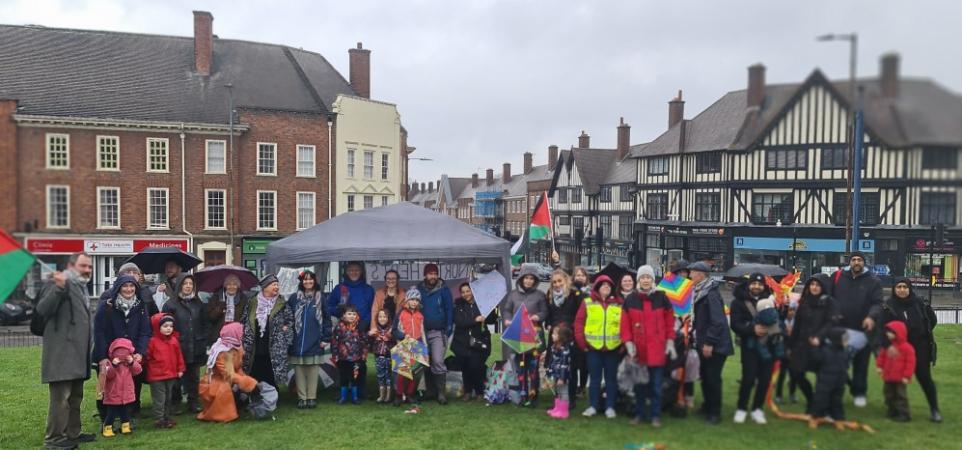
In preparation for this event, the Hitchin group – supporters of the Palestine Solidarity Campaign – had organised a kite-making workshop where a Palestinian now living in Britain would demonstrate how children’s kites are made in Gaza, with bamboo and tissue paper. Invites for the workshop had already gone out when the intended venue – a community centre which happened to be owned by North Hertfordshire District Council – suddenly cancelled the booking “due to community safety concerns”.
The council had received an alarming letter from UKLFI which said the group’s kite-making plans had caused “outrage” in the local Jewish community. UKLFI asserted that there was a “link” between the Palestinian kites workshop in Hitchin and kites previously used as weapons to set fire to fields and woodland in Israel. It cited an Israeli news report from 2018 regarding the incendiary kites and added that "Palestinian themed kites" were also “a grim reminder” of the October 7 massacre of Israelis when use of paragliders by Hamas had formed “a significant and striking part of this onslaught”.
UKLFI went on to warn that North Hertfordshire council would be failing in its duty under the Equality Act if it allowed the workshop to take place on council premises. The letter cited Section 149 which says public sector bodies (such as councils) must have due regard to “the need to foster good relations” between different religious and ethnic communities – and in UKLFI’s view the kite workshop would contravene that. While this scared the council, the kite-makers were undeterred and the workshop went ahead at a different location.
‘Victimised’ by a display of plates
Another public sector body targeted under Section 149 was the Chelsea and Westminster Hospital in London which incorporates a school where sick children can continue their education. The school tries to cultivate an international ethos and, over the years, has developed ties with other schools in Finland, Greece, Germany, Hungary, Ireland, Italy, and Poland.
In 2012, as part of the British Council’s “Crossing Borders” programme, three teachers from the hospital school visited schools in Gaza run by the UN’s refugee agency, UNWRA. In Gaza, students aged 14 and 15 had produced dozens of pictures illustrating everyday life in Palestine. “Some showed Palestinians carrying water jars, baking bread and milling lentils, beans and chickpeas. Others showed fishermen with their catch, workers harvesting olives and children playing with marbles,” Middle East Eye reported.
One of the visiting teachers made scanned copies and, back in London, students at the hospital school chose elements from the pictures to be transferred onto plates made in pottery classes.
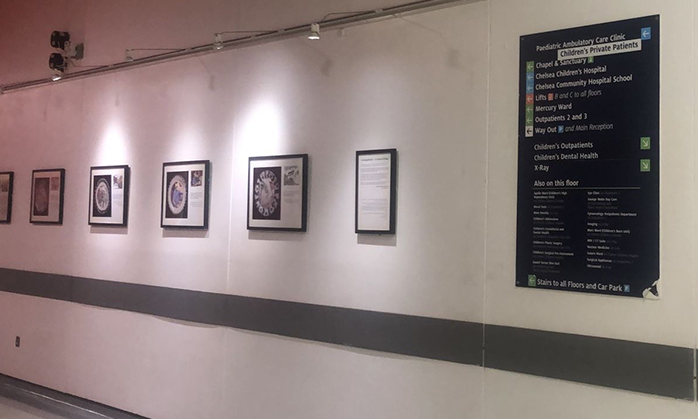
The 21 plates were then displayed on a wall in the hospital next to the children’s outpatients department where they remained for 11 years without complaint. In February last year, though, they were suddenly removed after UKLFI sent a letter saying they made some Jewish patients feel “vulnerable, harassed and victimised”.
UKLFI objected to two plates in particular. One showed an olive branch and the Dome of the Rock in East Jerusalem with a Palestinian flag flying over it. International law regards East Jerusalem as Palestinian territory but UKLFI doesn’t, and its letter described the flag’s inclusion as “offensive to many Jewish people”.
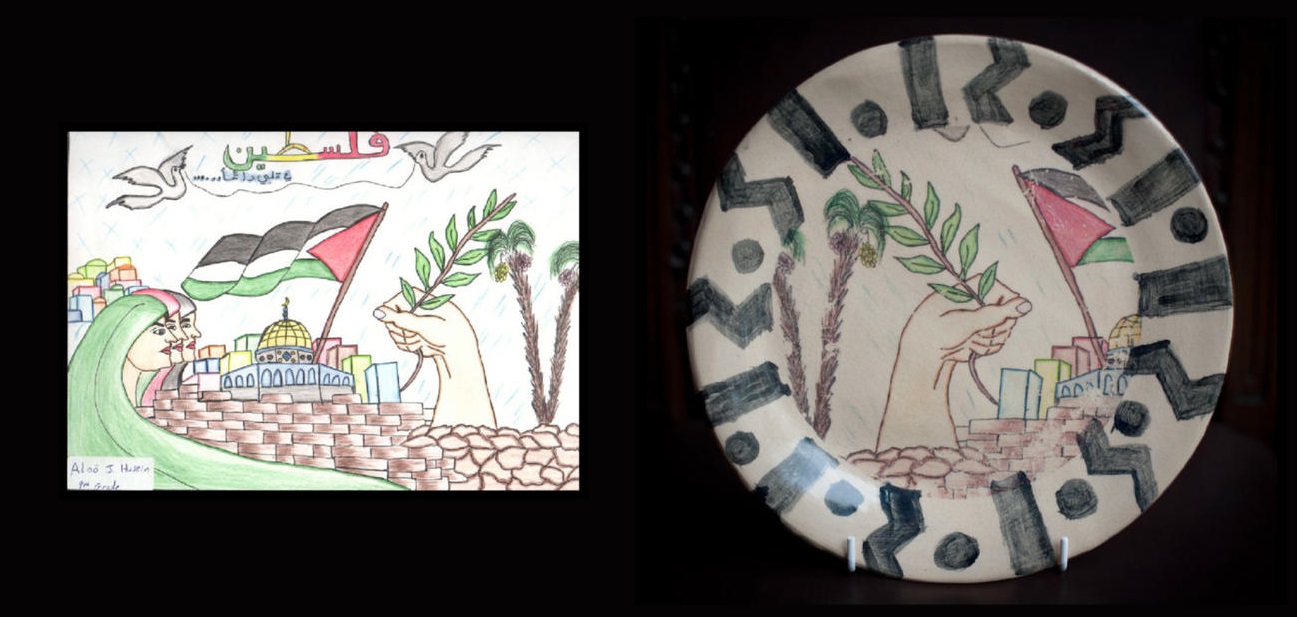
The other plate mentioned by UKLFI showed a fisherman beside the sea, holding a net. A caption accompanying it said: “Fishing with nets is one of the oldest industries in Palestine,” adding that “the shoreline stretches for 224 km from Rafah in the south to Ra’as al Naqoura in the north” (i.e. from Gaza’s border with Egypt to Israel’s border with Lebanon). UKLFI commented: “Thus the existence of Israel is denied and ‘Palestine’ is regarded as covering the entirety of Israel.” That objection, though, referred to the accompanying note, not the plate itself, and it’s unclear why all the plates were removed.
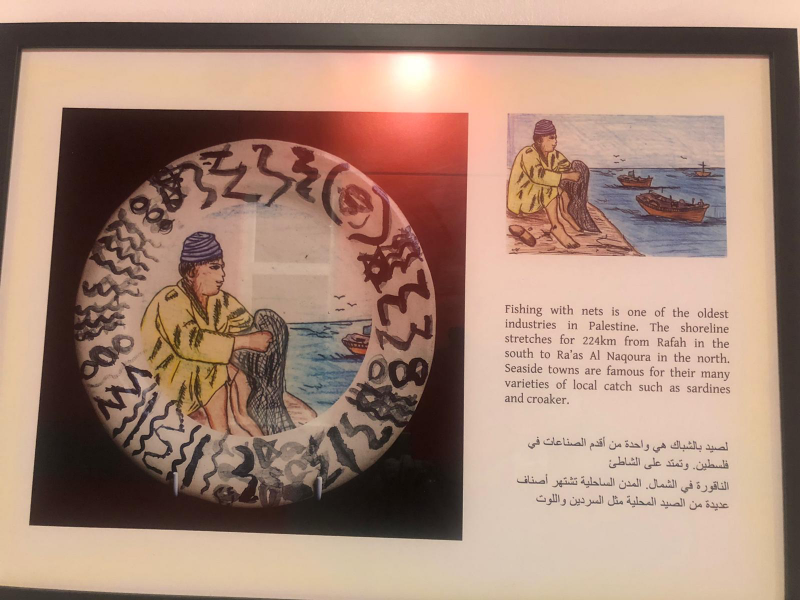
Heavyweight backing
UKLFI operates partly through a company (UKLFI Limited) and partly through a charity (UKLFI Charitable Trust). The limited company was founded by its current chief executive, barrister Jonathan Turner, in 2010 – originally under the name Action 4 Peace. The most recent financial statement filed at Companies House shows that in 2022 it had nine employees, with “cash at bank and in hand” totalling £412,000. It paid £147,000 to directors in the form of consultancy fees.
The charitable trust was established in 2016 to “facilitate fund raising” from UK donors for parts of UKLFI’s activities that are charitable under UK law. Its income in 2022 was £105,000.
Despite a lack of prominence among the general public, UKLFI is well connected, with heavyweight backing from senior figures in Britain’s legal establishment. All but one of its 10 patrons are King’s Counsel and six are members of the House of Lords: Lord Carlile of Berriew, Baroness Deech, Lord Dyson, Lord Pannick, Lord Grabiner and Lord Howard of Lympne (Michael Howard, the former Conservative Party leader). Another patron is Professor Richard Susskind, IT adviser to the Lord Chief Justice.
Letters of complaint are only one of UKLFI’s activities. Its stated purposes include legal support for students who “require protection against antisemitism, hate speech, etc,” and “basic training for lawyers on international law and Israel”.
Twice in the last year UKLFI has given testimony to parliament on legal matters relating to Israel. On the Palestinian issue, though, its interpretations of the law are wildly out of line with the international consensus and the policies of successive British governments, not to mention rulings by the UN's highest court. Among other things, UKLFI claims Israel’s occupation of the West Bank is lawful and that Israeli settlements there are legitimate [see Part Two].
Community relations versus free expression
UKLFI’s basic argument when complaining about pro-Palestinian activities is that they pose a threat to good community relations, and the implication of its letters is that the danger is serious enough to warrant restricting free speech. From the letters, though, it’s often hard to judge the actual level of risk. Clearly, some people were annoyed about the kite-making workshop in Hitchin (we are not told how many) but the kite-flyers themselves seem remarkably unthreatening — sincere folk horrified by the Gaza war whose sympathies lie with the women and children caught up in it, not with Hamas. On social media and in news reports they speak of kites as a symbol of hope and freedom.
The possible effect on community relations also has to be balanced against upholding the right to free expression — a right which the law regards as one of the essentials of democracy. Inevitably, that leads to differences of opinion as to where the line should be drawn.
In April the Camden New Journal, a local paper in north London, published an advertisement for meetings about Palestine organised by the Camden Abu Dis Friendship Association. The ad began with the words “Ceasefire now! End the genocide!” and continued: “Let’s talk about Palestine. Come and hear Palestinian speakers, learn more about Palestine, discuss local work for human rights and an end to apartheid in Israel/Palestine.”
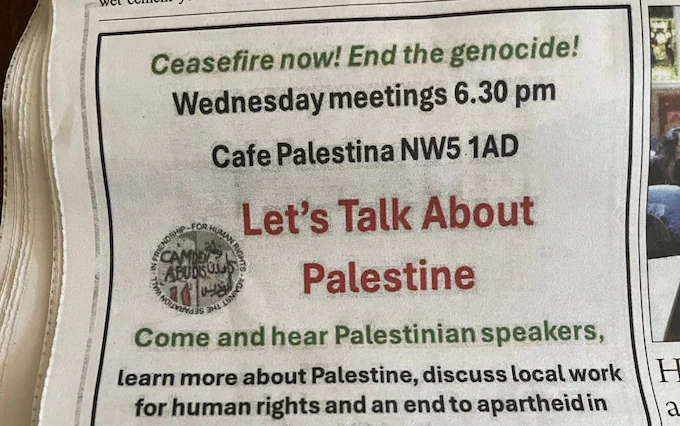
A reader complained that the references to apartheid and genocide were “spurious” and “inflammatory”. The editor wrote back saying he didn’t believe the advert had led to increased community tensions “but we will monitor any wider effect that this booking has caused”. He added: “In our editorial decisions, we believe we have stepped sensitively through this issue, which clearly invokes very contrasting opinions, and our hope is for local community cohesion.”
The reader then took his complaint to the Advertising Standards Authority (ASA) which declined to investigate. Its spokesperson told the Telegraph: “We recognise that, while there are many opinions about this issue, advertisers have rights of freedom of expression under the law … We have to carefully balance protecting the public from ads likely to cause serious or widespread offence with the importance of not unduly restricting the expression of views on matters of public debate.”
This doesn’t appear to have satisfied UKLFI, though, and according to the Jewish Chronicle it has since been urging the complainer to appeal to the Independent Reviewer of ASA Rulings.
The right to ‘offend, shock or disturb’
The Israeli/Palestinian conflict provokes strong feelings on both sides, often expressed forcefully. In Britain it’s generally accepted that there are some limits to what can be said— such as incitement to violence and hate speech (including antisemitism) — but that doesn’t rule out criticism of Israel, even robust criticism, if international standards are applied. In the words of the IHRA’s working definition of antisemitism, “Criticism of Israel similar to that levelled against any other country cannot be regarded as antisemitic.”
Given the nature of the conflict, even legitimate criticism is liable to result in complaints but placating objectors by silencing their opponents can easily aggravate community tensions rather than soothing them. It's also important to distinguish between complaints that reflect widespread public concern and those that come from small numbers of vociferous individuals who find the discourse offensive.
The law doesn’t necessarily protect people against being offended, though. The European Court of Human Rights made that clear with a landmark ruling in 1976. In a democratic society, it said, the demands of “pluralism, tolerance and broadmindedness” mean that freedom of expression “is applicable not only to ‘information’ or ‘ideas’ that are favourably received or regarded as inoffensive or as a matter of indifference, but also to those that offend, shock or disturb the State or any sector of the population” [italics added].
There are good reasons for that, as can be seen from the example of Egypt – a country with a long history of letting individuals bring court cases against people whose views have allegedly offended them. The litigants are usually religious busybodies and most of the lawsuits are plainly vexatious.
One notorious case was the forcible divorcing of Nasr Abu Zayd, a teacher at Cairo university. Islamists took exception to some of his views and accused him of apostasy. On that basis they went to court and the court divorced him from his wife on the grounds that Islamic rules prevent a Muslim woman from being married to an apostate. In another case, the author of a dystopian novel about life in Cairo was sentenced to two years in jail for “violating public decency” after his accuser claimed that while reading an extract “his heartbeat fluctuated, his blood pressure dropped and he became severely ill”.
In asserting the right to “offend, shock or disturb”, though, the European Court explained that its ruling did not give people carte blanche to cause offence. Exercising free expression brings “duties and responsibilities”, it said, adding that any restrictions or penalties imposed by the authorities must have a “lawful” purpose and be “proportionate”.
'Terrorism' by the BMA
There have been several instances of UKLFI unsheathing its legal sword needlessly. One was in January when it when it accused the British Medical Association (BMA) of an offence under the Terrorism Act.
The doctors’ union had sent a letter to Lord Cameron (foreign secretary at the time) expressing concern at the medical and humanitarian situation in Gaza and urging the British government to “work with other governments” to call for an immediate ceasefire.
UKLFI complained that the letter had not mentioned the attack by Hamas on October 7 and was “so one-sided as to give the impression that the BMA is a supporter of the terrorist organisation, Hamas. It appears to be expressing an opinion or belief that is supportive of this proscribed organisation, contrary to s.12(1A) of the Terrorism Act 2000.”
This was a ludicrous claim because the BMA had already made its view of the Hamas attack very clear in a position statement posted on its website. The BMA’s letter had not only mentioned the position statement but helpfully provided a link to it. The relevant part said: “The Hamas attack on civilians in Israel represents a gross violation of international humanitarian law and has led to 1,400 deaths so far. We unreservedly denounce this action.”
World Cup mix-up
On another occasion, in 2022, UKLFI mistakenly accused FIFA, the international football body, of discriminating against Israelis by not allowing them to purchase hospitality packages for the World Cup in Qatar.
At first sight its claim seemed plausible. A company called Match Hospitality had secured an exclusive deal with FIFA to manage the bookings and FIFA’s website had a drop-down menu listing countries where the company had a local sales agent. Palestine was listed, but not Israel.
“It is discriminatory not to allow Israelis to purchase hospitality packages, and in breach of FIFA’s Code of Ethics, Disciplinary Code and Statutes,” UKLFI said. It called on FIFA to ensure “as a matter of urgency that there is an agent on its official list who will sell hospitality packages to Israelis”.
FIFA responded a few days later, saying there was nothing to stop Israelis buying hospitality packages. Israel was one of more than 100 countries omitted from the list because they had no local agent. People in unlisted countries could still buy the packages directly from Match Hospitality.
FIFA added that Palestine was listed in the drop-down menu because a company in Hong Kong was acting as agent for all territories in the Asian Football Confederation – of which Palestine is a member.
A wayward emoji
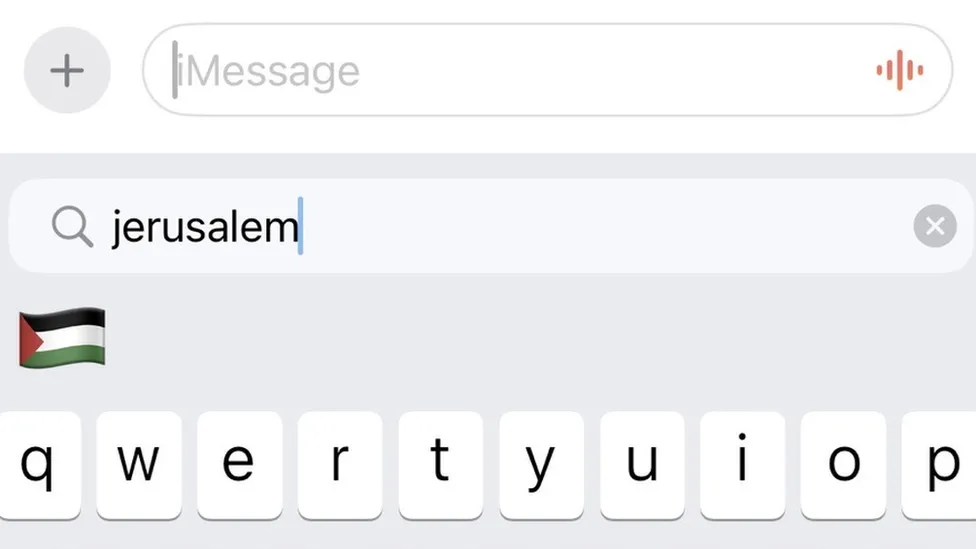
In April, following a software update on Apple iPhones, some users noticed that typing “Jerusalem” in the search box caused an emoji of a Palestinian flag to pop up. Apple responded swiftly, saying the flag was unintentional. It blamed a “predictive emoji bug” in the software and promised to fix it.
Some suspected, though with no real evidence, that the cause of the problem was sabotage rather than a bug but, either way, the company had made clear it would rectify the situation. That didn’t discourage UKLFI from launching an attack on Apple two days later, however.
A report on its website headed “Apple causes international incident” began: “Apple has been accused of breaching discrimination laws and its own policies by programming the Palestine flag emoji to pop up when the word Jerusalem is typed into its phones.”
UKLFI told Apple: “You have effectively designated the capital city of the only Jewish state in the world, which is also the religious centre for Jews, as part of Palestine. This constitutes harassment of UK consumers of Apple’s products who are of Jewish and Israeli origin, contrary to section 29(3) of the [UK’s] Equality Act 2010.”
It added: “The flag creates ‘an intimidating, hostile, degrading, humiliating or offensive environment’ for Israeli and Jewish consumers and therefore amounts to ‘harassment’ as defined in section 26(1) of the Equality Act.”
By the time it posted this, though, there was no need for legal threats as Apple had already promised to remove the flag. UKLFI was well aware of that but it still seemed determined to make a mountain out of an emoji.
Part Two >>>


